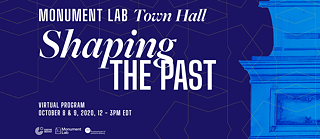|
12:00 PM-3:00 PM
Shaping the Past: Town Hall
Conference|Conference on Innovative Forms of Memory Culture
-
Online
- Language English (with simultaneous interpretation in German and Spanish)
- Price Free
- Part of series: Shaping the Past: Memory Month Washington

The Town Hall features a series of four keynote conversations and video presentations from some of the most interesting memory workers working across the United States, Canada, Mexico, and Germany. Across two days of conversations, curators, writers, artists, and activists will discuss memory work across borders and the relationship between art and activism. Monument Lab Town Hall will explore critical and creative practices we might need towards monumental justice, education, and care.
Shaping the Past is partnership of the Goethe-Institut, Monument Lab, and the Bundeszentrale für politische Bildung (Federal Agency for Civic Education). The project connects to the activist and artistic work of local, national, and transnational movements as a reflection of memory culture and discusses new perspectives on forms of memory.
Register via Eventbrite
Full Schedule
October 8, 12:00-3:00pm EDT
Introductions by Paul Farber (Artistic Director, Monument Lab) und Johannes Ebert (Secretary General, Goethe-Instituts)
Opening Performance
Curated by Arielle Julia Brown (Founder and Director, Black Spatial Relics)
12:15-1:30pm EDT
Curating Memory and Justice
To curate means to “care for” the stories and objects of others, in part by co-creating complex narratives that facilitate memory-making, remembrance, and collective mourning and acknowledgment. What kinds of frameworks and practices do curators, together with artists and the publics they serve, adopt to foreground questions of justice through their work?
Bonaventure Soh Bejeng Ndikung (Founder and Artistic Director, SAVVY Contemporary) and Jasmine Wahi (Social Justice Curator, Bronx Museum)
Moderated by Patricia Eunji Kim (Assistant Professor, New York University; Assistant Curator, Monument Lab)
1:30-1:45pm EDT
Video Presentations from the 2020 Monument Lab Transnational Fellows
1:45-3:00pm EDT
Art, Activism, and Shaping the Public Sphere
Art and performance create physical, virtual, and conceptual spaces for critical dialogue and political action. Art and activism lean on each other, opening up avenues for new alliances, coalitions, and kin relations in the service of equity and justice. What is the responsibility of the artist-as-activist to both their own and/or other communities?
Paul Ramírez Jonas (Artist; Professor, Hunter College) and Cannupa Hanska Luger (Artist)
Moderated by Michelle Angela Ortiz (Artist)
October 9, 12:00-3:00pm EDT
Introductions by Stephan Nicoleau, Monument Lab Advisory Board and Thomas Krüger, President of the Federal Agency for Civic Education (Bundeszentrale für politische Bildung/bpb)
12:15-1:30pm EDT
Memory, Trauma, and Transformation
Public art and memorials carve out physical space to grapple with loss, pain, and trauma. Processes of mourning may register the ongoing weight of memory, as well as open new, transformative possibilities. What are the roles of public landscapes and spaces in contending with and addressing individual and collective memories and historical traumas?
Daniela Schiller (Associate Professor of Neuroscience and Psychiatry, Icahn School of Medicine) and Mabel Wilson (Professor of Architecture, Planning, and Preservation, Columbia University)
Moderated by Sue Mobley (Senior Research Scholar, Monument Lab)
1:30-1:45pm EDT
Video Presentations from the 2020 Monument Lab Transnational Fellows
1:45-3:00pm EDT
Confronting Art and History
From museums and galleries to the academy and non-profit organizations, culture workers are challenging institutions that are historically entrenched in colonialism and white supremacy to evolve and grow. How might institutions of art and history account and even atone for their participation in such systems of power? What might an ethics of equity and care look like in memory-work?
Seph Rodney (Senior Editor at Hyperallergic) and Mirjam Zadoff (Director, Munich Documentation Centre for the History of National Socialism)
Moderated by Ken Lum (Curatorial Advisor and Co-Founder, Monument Lab)